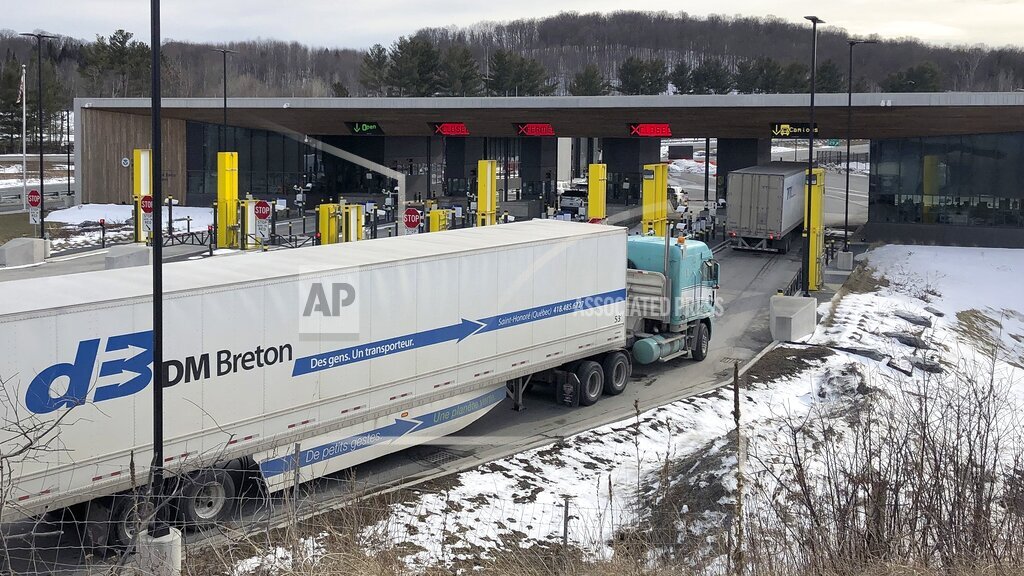The U.S. will reopen its land borders with Canada and Mexico to nonessential travel next month, ending a 19-month freeze due to the COVID-19 pandemic as the country moves to require all international visitors to be vaccinated against the coronavirus.
Vehicle, rail and ferry travel between the U.S. and Canada and Mexico has been largely restricted to essential travel, such as trade, since the earliest days of the pandemic. The new rules, announced Wednesday, will allow fully vaccinated foreign nationals to enter the U.S. regardless of the reason for travel starting in early November, when a similar easing of restrictions is set to kick in for air travel into the country. By mid-January, even essential travelers seeking to enter the U.S., like truck drivers, will need to be fully vaccinated.
Both Mexico and Canada have pressed the U.S. for months to ease restrictions on travel that have separated families and curtailed leisure trips since the onset of the pandemic. The latest move follows last month’s announcement that the U.S. will end country-based travel bans for air travel and instead require vaccination for foreign nationals seeking to enter by plane.
Reactions from the borders
Families separated by COVID-19 restrictions and beleaguered business owners rejoiced Wednesday after the announcement that the U.S. will be reopening its land borders next month.
The ban has had enormous social and cultural impact, preventing family gatherings when relatives live on different sides of the border. Community events have stalled even as cities away from U.S. borders have inched toward normalcy.
“This is a win for families who’ve been separated and businesses and tourism industries whose operations have been blocked since the start of the pandemic,” said U.S. Sen. Jeanne Shaheen of New Hampshire, echoing reactions of other federal, state and local officials.
Travel across land borders from Canada and Mexico has been largely restricted to workers whose jobs are deemed essential. That’s hurt business as well as families: In Del Rio, Texas, Mexican visitors account for about 65% of retail sales, said Blanca Larson, executive director of the chamber of commerce and visitors bureau in the city of 35,000 people.
“Along the border, we’re like more of one community than two different communities,” she said.
Shopping malls and big box retailers in U.S. border towns whose parking spaces had been filled by cars with Mexican license plates were hit hard by travel restrictions.
San Diego Mayor Todd Gloria said the economic impact was hard to quantify but can be seen in the sparse presence of shoppers at a high-end outlet mall on the city’s border with Tijuana, Mexico. The decision comes at a critical time ahead of the holiday shopping season.
Cross-border traffic has plummeted since the pandemic, according to U.S. Department of Transportation figures. The number of vehicle passengers entering the U.S. in Niagara Falls, New York — the busiest land crossing on the Canadian border — fell 83% to 1.7 million in 2020 and has remained low this year.
“Losing those customers over the last 18 months has been one of the primary reasons our hotels, restaurants and attractions have been suffering,” said Patrick Kaler, president and chief executive of Visit Buffalo Niagara, the area’s tourism agency.
A change coming in November
Senior administration officials had previewed the new land border policy late Tuesday. Both policies will take effect in early November, the officials said.
Homeland Security Secretary Alejandro Mayorkas said he was “pleased to be taking steps to resume regular travel in a safe and sustainable manner” and lauded the economic benefits of it.

Travelers entering the U.S. by vehicle, rail and ferry will be asked about their vaccination status as part of the standard U.S. Customs and Border Protection admissions process. At officers’ discretion, travelers will have their proof of vaccination verified in a secondary screening process.
According to The New York Times’s worldwide COVID vaccination tracker, 38% of Mexico’s population is now fully vaccinated, with 52% having received at least one dose.
In Canada, 78% of the population is fully vaccinated, with 73% having received at least one dose.
Unlike air travel, for which proof of a negative COVID-19 test is required before boarding a flight to enter the U.S., no testing will be required to enter the U.S. by land or sea, provided the travelers meet the vaccination requirement.








